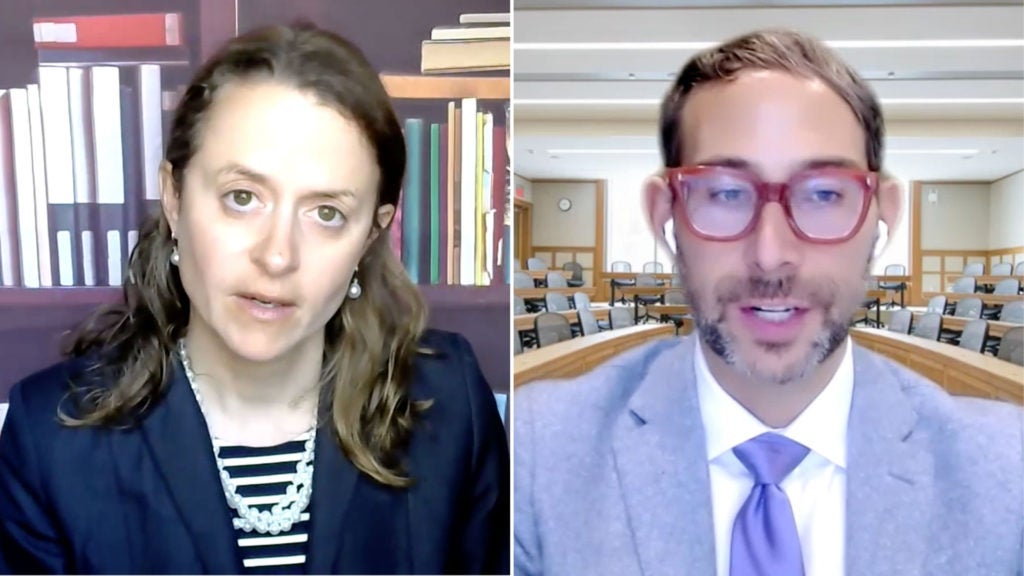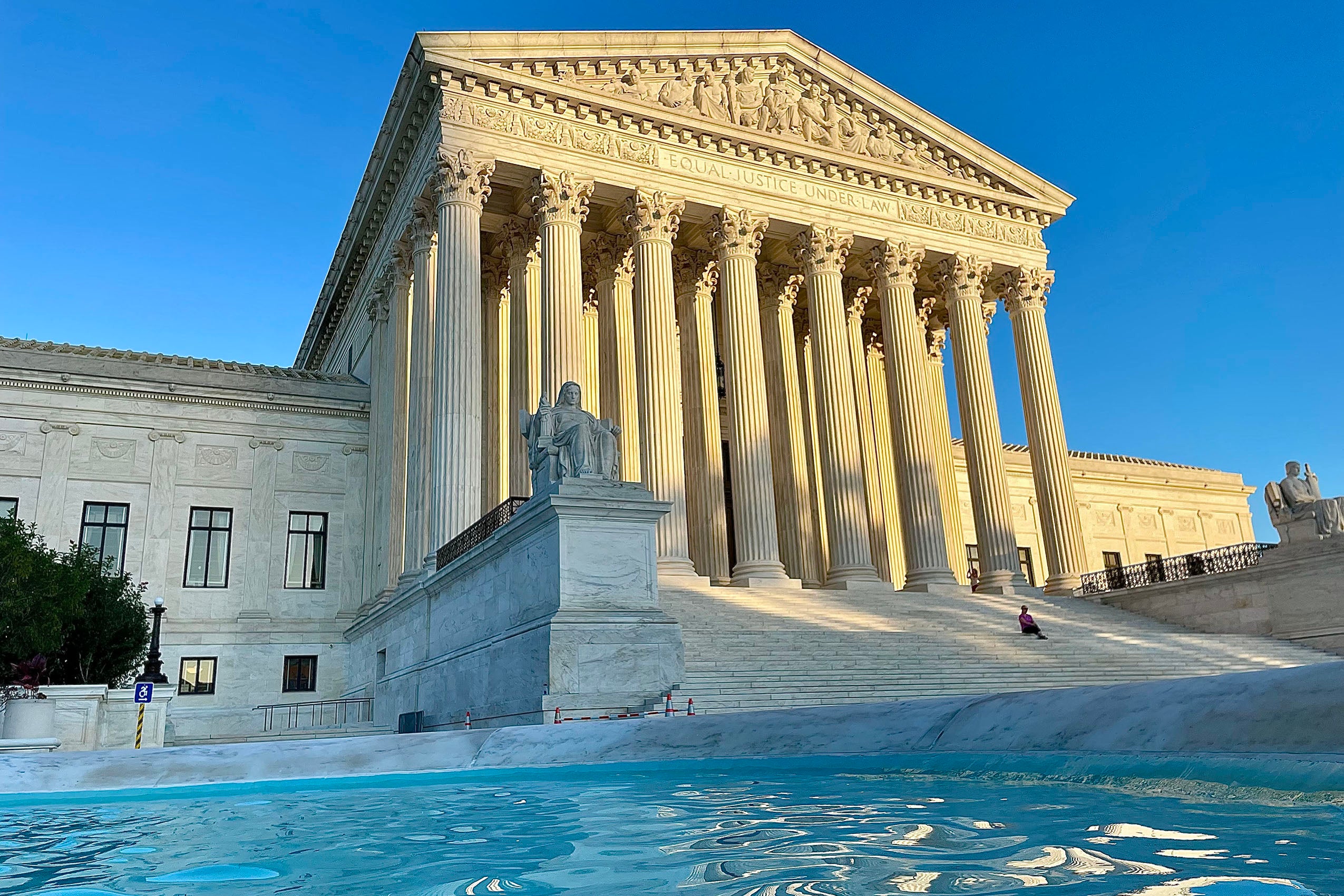It is “close to unprecedented or unprecedented” for the Supreme Court of the United States to “undo[…] rights that were viewed as constitutionally central for half a century,” said Mary Ziegler ’07, the Daniel P.S. Paul Visiting Professor of Constitutional Law at Harvard Law School at a virtual town hall event on Thursday.
Ziegler, along with I. Glenn Cohen ’03, the James A. Attwood and Leslie Williams Professor of Law, was discussing abortion rights in the wake of last week’s leaked draft Supreme Court opinion in Dobbs v. Jackson Women’s Health Organization. As written, the draft decision — later verified to be authentic, though not yet final — would overturn Roe v. Wade, the 1973 ruling that established a constitutional right to abortion.
Carmel Shachar ’10, executive director of the Petrie-Flom Center for Health Law Policy, Biotechnology & Bioethics, where Cohen is also faculty director, moderated the event, “Roe in limbo: A town hall on the leaked Dobbs opinion.” Responding to a mix of questions from Shachar and the audience, the panelists spoke about the meaning and potential impact of the draft decision — including what a post-Roe legal landscape could look like across America.

“The draft opinion holds that Roe v. Wade was not just wrong, but egregiously wrong,” began Ziegler, outlining some of the rationale provided by Justice Samuel Alito in his draft. “It asks ‘was there a right to privacy that is deeply rooted in the nation’s history and tradition,’ and concludes that that right is not deeply rooted.”
On that point, Shachar wondered if, had Roe been decided on a theory of equality instead of privacy, the Court would have had a more difficult time overturning precedent in the Dobbs case.
“I don’t think it would have mattered,” in the long run, responded Ziegler, adding that she believed the history of the Roe decision shows that “people who are opposed to abortion don’t think Roe was wrong primarily because its reasoning was unconvincing — they think that Roe was wrong because of the outcome it reached.”
“I think we’re already seeing a little bit of the Monday morning quarterbacking on the briefing and arguments here,” said Cohen. “[The potential decision] is kind of a natural apogee of the direction that we were going in.”
With a nod to Ziegler’s research on the topic, Cohen said that there has long been a debate within the anti-abortion movement between those who favor “incrementalism,” that is, chipping away at Roe through restrictions on abortion providers, and “people who wanted to bring a full-on confrontation between the Supreme Court and these laws, and to push for Roe’s overruling.”
So, while neither Ziegler nor Cohen expressed shock that the draft opinion took an anti-abortion stance, “To the extent there have been any surprises, it’s maybe been the speed with which the Court delivers, or is going to deliver, if this draft holds, that coup de grâce,” Ziegler said.
She was also surprised at the draft’s tone. “I thought there would be more damage control or an effort to be more empathetic or manag[e] institutional perceptions in the draft,” Ziegler said. “I thought that while the draft would inevitably overrule Roe, it would be done in a way that was intended to show profound respect for people with differing views on abortion.”
‘Process failure’
One audience member asked if any of the recently confirmed justices — some of whom, like Brett Kavanaugh, had testified that Roe was “settled law” during Senate confirmation hearings — could have committed perjury if they now voted to overturn precedent.
Not likely, said Cohen, before adding that he questions the effectiveness of such hearings. “It is truthful that Roe is ‘settled law,’ but what does it mean to be ‘settled law’? What are the conditions for stare decisis?” he said. “And why I have such a low opinion [of the hearings] is that they are a kind of charade, where the prospective justices say this much, and then the senators who have qualms can say that they asked the question, but then they never really press down, and if they press down too hard, the answer will be ‘I could never take a position on a case likely to come before the Court.’”
“As Professor Cohen says, it’s a process failure,” Ziegler agreed. “There’s a relatively longstanding tradition of not answering the question. The kinds of sound bites you will see the justices give are things about ‘settled law’ and Roe as a precedent of the Court that say absolutely nothing about what they are going to do. And of course, that’s by design.”
Turning to the leak — itself nearly unprecedented in the Court’s history — Shachar asked the panelists to theorize why it happened in this case.
“My guess is because people are watching,” said Ziegler. “Roe is by far the most recognized, best-known Supreme Court opinion. That means that a decision overruling it will be viewed as more consequential by more people.”
After Roe
Assuming that the Court’s final decision closely resembles the draft opinion, could a nationwide abortion ban be next? And how would the Court think about the constitutionality of such a law?
Without an actual bill, it was difficult to speculate, said Ziegler. “The constitutional challenges would depend on what the bill says, and what congressional authority it invokes — whether it’s section five of the Fourteenth Amendment, or the Commerce Clause.”
Shachar wondered how individual states would respond to the fall of Roe. “Assuming there’s no real federal action, it seems that states are going to very much move in opposite directions — that you’ll see a lot of states such as Texas that are going to effectively ban abortion … And then you’re going to have states such as California saying ‘we are an abortion haven,’” she said.
Cohen drew a comparison with Ireland’s history of abortion — in which the nation gradually eased previously severe restrictions, saying the U.S. could move in the opposite direction. “Ireland begins with constitutional restrictions on abortion. It then faces — with the X case and others — questions about women traveling from Ireland to elsewhere [for an abortion], and the extraterritorial reach of prosecution … Then, to a travel amendment that explicitly permits that. Then ultimately, we get a referendum liberalizing abortion laws as a constitutional matter. We’re likely to see exactly the same cases [here] but in reverse.”
Ziegler agreed that there were still unresolved questions about the extraterritorial application of criminal law. “I think what’s changed in part is that abortion rates have already declined significantly in a lot of red states, and it has not declined in large, populous, mostly blue, but sometimes purple, states like New York, California, and Florida. I think there is a real awareness in conservative states that unless you have extraterritorial application of laws, the laws will have loopholes. And in many instances, the abortion rate will not go down even in a post-Roe United States.”
Finally, Shachar asked if a Dobbs decision overturning Roe could affect other reproductive issues, such as in vitro fertilization.
“We’ve seen some states essentially call out that they are not regulating fertility and fertility treatment,” said Ziegler, before adding “We’ve seen other states essentially drafting language that’s either subtly, or intentionally, open-ended, to probably bridge divides within the anti-abortion movement in those states.”
The right to IVF, and the right to dispose of unneeded or unwanted embryos, has not been fully articulated by the courts, said Cohen. “I think the question to ask is not so much the constitutional question, ‘did you have a right yesterday that no longer exists?’ But whether states are going to be involved in, and feel pressure to, make inroads on IVF and on embryo destruction in particular, after this opinion. It’s a hard political question.”
Cohen and Ziegler pointed out that access to medication abortion through telemedicine services is likely to be another critical issue in the future, as well.
If the draft opinion becomes the law of the land, Ziegler said abortion rights advocates could start by turning to direct democracy at the state level. In addition, “There are lots of ingredients for an effective counter movement to Dobbs, if you’re looking in the long term — it’s not a question of months but years,” she said. “Thinking in terms of organizing, political lobbying, a restoration of something that looks like a genuine grassroots pro-choice movement, which I think has been missing in recent decades.”
https://soundcloud.com/harvardlaw/roe-in-limbo-a-town-hall-on-the-leaked-dobbs-opinion/s-DHfN4n188dG
